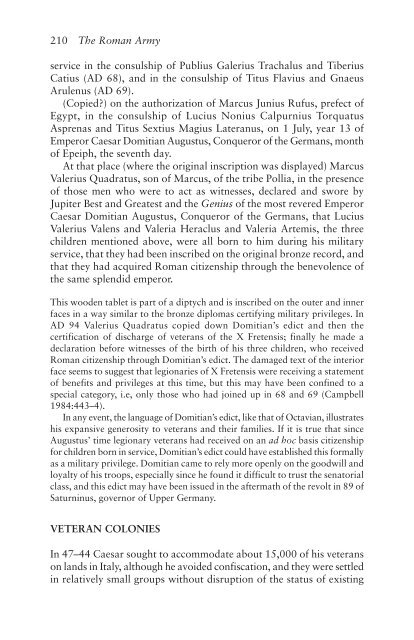The Roman Army, 31 BC–AD 337: A Sourcebook
The Roman Army, 31 BC–AD 337: A Sourcebook
The Roman Army, 31 BC–AD 337: A Sourcebook
Create successful ePaper yourself
Turn your PDF publications into a flip-book with our unique Google optimized e-Paper software.
210 <strong>The</strong> <strong>Roman</strong> <strong>Army</strong><br />
service in the consulship of Publius Galerius Trachalus and Tiberius<br />
Catius (AD 68), and in the consulship of Titus Flavius and Gnaeus<br />
Arulenus (AD 69).<br />
(Copied?) on the authorization of Marcus Junius Rufus, prefect of<br />
Egypt, in the consulship of Lucius Nonius Calpurnius Torquatus<br />
Asprenas and Titus Sextius Magius Lateranus, on 1 July, year 13 of<br />
Emperor Caesar Domitian Augustus, Conqueror of the Germans, month<br />
of Epeiph, the seventh day.<br />
At that place (where the original inscription was displayed) Marcus<br />
Valerius Quadratus, son of Marcus, of the tribe Pollia, in the presence<br />
of those men who were to act as witnesses, declared and swore by<br />
Jupiter Best and Greatest and the Genius of the most revered Emperor<br />
Caesar Domitian Augustus, Conqueror of the Germans, that Lucius<br />
Valerius Valens and Valeria Heraclus and Valeria Artemis, the three<br />
children mentioned above, were all born to him during his military<br />
service, that they had been inscribed on the original bronze record, and<br />
that they had acquired <strong>Roman</strong> citizenship through the benevolence of<br />
the same splendid emperor.<br />
This wooden tablet is part of a diptych and is inscribed on the outer and inner<br />
faces in a way similar to the bronze diplomas certifying military privileges. In<br />
AD 94 Valerius Quadratus copied down Domitian’s edict and then the<br />
certification of discharge of veterans of the X Fretensis; finally he made a<br />
declaration before witnesses of the birth of his three children, who received<br />
<strong>Roman</strong> citizenship through Domitian’s edict. <strong>The</strong> damaged text of the interior<br />
face seems to suggest that legionaries of X Fretensis were receiving a statement<br />
of benefits and privileges at this time, but this may have been confined to a<br />
special category, i.e, only those who had joined up in 68 and 69 (Campbell<br />
1984:443–4).<br />
In any event, the language of Domitian’s edict, like that of Octavian, illustrates<br />
his expansive generosity to veterans and their families. If it is true that since<br />
Augustus’ time legionary veterans had received on an ad hoc basis citizenship<br />
for children born in service, Domitian’s edict could have established this formally<br />
as a military privilege. Domitian came to rely more openly on the goodwill and<br />
loyalty of his troops, especially since he found it difficult to trust the senatorial<br />
class, and this edict may have been issued in the aftermath of the revolt in 89 of<br />
Saturninus, governor of Upper Germany.<br />
VETERAN COLONIES<br />
In 47–44 Caesar sought to accommodate about 15,000 of his veterans<br />
on lands in Italy, although he avoided confiscation, and they were settled<br />
in relatively small groups without disruption of the status of existing



